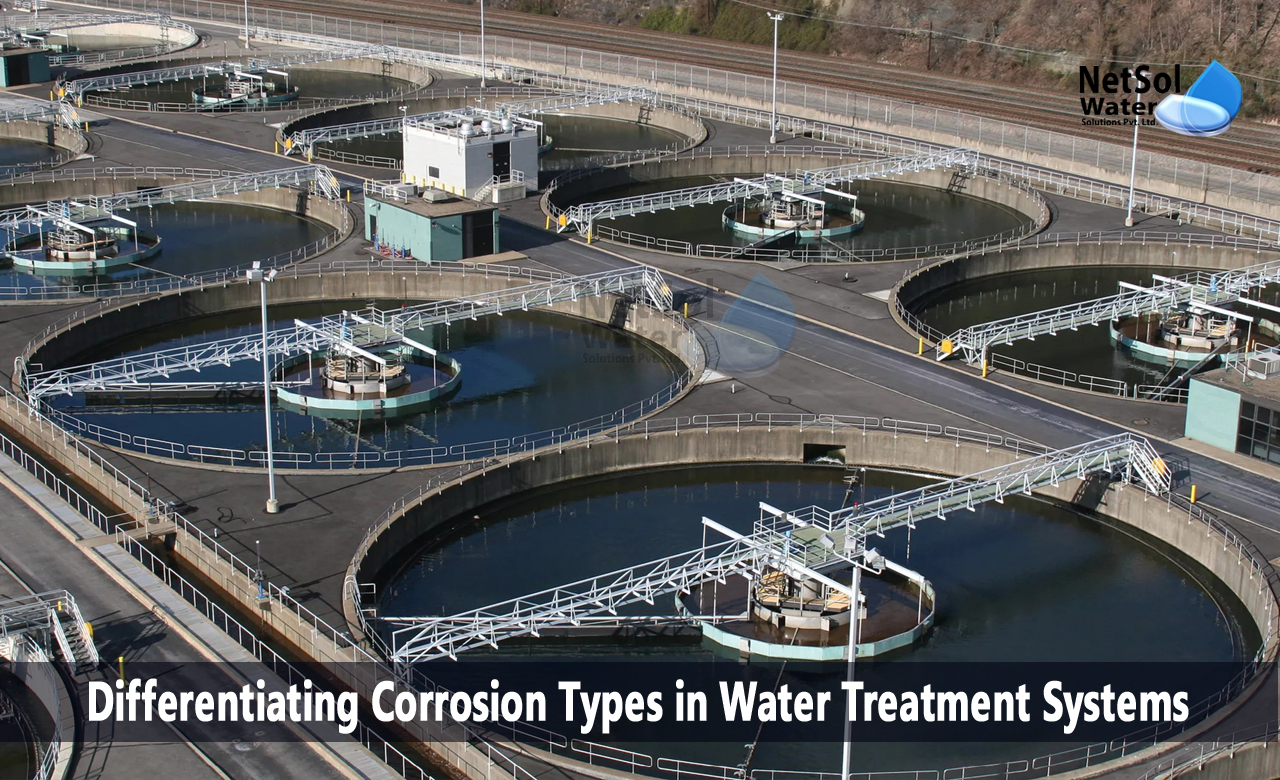Water treatment system corrosion is a costly issue. The cost of corrosion in water and wastewater treatment plants or systems is projected to be more than billions a year. Corrosion-related metal loss shortens the lifespan of systems, raises maintenance costs, and ultimately causes premature equipment failure.
Additionally, corrosion can result in deposits that obstruct water flow, contaminate heat exchange surfaces, and lower the overall effectiveness of water systems. It can be easier to identify and fix corrosion-related issues, if you have a basic awareness of the various types of corrosion.
How many types of corrosion in water treatment systems?
Typically, corrosion is classified as either general or localized. An exposed metal surface experiences homogeneous generalised corrosion. Fouling is typically a more serious issue with widespread corrosion, than equipment failure.
Generally speaking, it is a more severe issue than broad rusting. Pitting, galvanic corrosion, under-deposit corrosion, and corrosion caused by microorganisms are examples of localised corrosion. Localised corrosion can cause a metal to perforate quickly, which can cause a system to collapse. Another type of corrosion that can't be simply divided into generalised or localised is erosion-corrosion.
1- Corrosion in the Pits
One of the most harmful types of corrosion is pitting, which is also one of the hardest to forecast. Pitting corrosion is the quick concentrated assault on discrete regions of a metal surface, while the remainder of the surface is largely undamaged.
Pitting is typically facilitated by stagnant or low-velocity circumstances as well as the presence of corrosive ions, i.e., oxygen, chlorides, sulphates, etc. The pit's contents are isolated from the surrounding environment once it has formed. The process becomes self-sustaining as it corrodes more and more over time.
2- Corrosion within the under-layer
Localized corrosion that takes place inside a crevice or another shielded area is known as under-deposit corrosion, also known as crevice corrosion. As in a hole, solutions beneath sediments become highly concentrated and caustic.
Alloys like stainless steel, copper, and aluminium that rely on oxide layers for protection, are particularly vulnerable to under-deposit corrosion attack. It is more common at the ends of lines, at lower floors, at the bottom of horizontal lines, and in areas with slower flow rates. By keeping metal surfaces clean, under-deposit corrosion can be avoided the best.
3- Inductive corrosion
When two different metals are in touch and submerged in a conducting fluid, galvanic corrosion happens. The anode corrodes and the cathode is shielded from corrosion by the corroding anode, due to the difference in galvanic potential between the two metals, creating what is basically a battery.
The reaction will precede more quickly the more galvanic potential difference there is, between the two metals. To determine whether galvanic corrosion is likely, which metal will serve as the anode to corrode, and how quickly the corrosion will progress, a galvanic potential chart can be utilized. To keep the two metals from coming into touch, break the circuit, and avoid galvanic attack, a dielectric union or similar device may be utilized.
4- Erosion-Corrosion
Corrosion and the physical abrasion brought on by fluid flow combine to form erosion-corrosion. Almost every metal is vulnerable to some kind of erosion-corrosion. Particularly vulnerable to erosion-corrosion are soft metals and metals, which rely on a passive layer to shield them from corrosion. The naked metal surface is exposed to the corrosive substance once the passive covering has been removed.
Fluids containing suspended particles have the potential to either directly induce or worsen erosion-corrosion. Designing systems that will keep flow velocities within the capabilities of the metals being used, and reduce the number of changes in direction is the best strategy to prevent erosion-corrosion. Specialized types of erosion corrosion include impingement and cavitation.
5- Tuberculation
Tubercles are collections of deposits and by-products of corrosion that cover specific areas, where metal is being lost. The water's chemistry, dissolved oxygen level, temperature, flow, and corrosion rates, all affect the structure. As metal is removed, tubercles form both internally and externally as corrosion by-products accumulate.
The corroded areas beneath tubercles are often large, irregular depressions when there isn't significant microbiologically influenced corrosion (MIC). In cooling water systems, not all reddish-brown iron oxide deposits are tubercles. The iron in the deposit may be material that was moved from another part of the system, if there is no metal loss beneath the deposit.
6- Corrosion Influenced by Microbiology (MIC)
"Microbiologically influenced corrosion" (MIC) is a term used to describe corrosion processes, when bacteria are important players. When it comes to tuberculation and other types of corrosion, MIC frequently plays a role.
The germs do not, however, directly assault metal. The metabolic waste products produced by bacterial growth typically assault or interact with the underlying metal in MIC situations.
Water treatment plant manufacturer and supplier
Netsol Water provides the experience and understanding to assist protect your vital water treatment systems. We provide a variety of corrosion protection techniques for your systems.
We develop and produce water treatment plants and wastewater treatment plants, which are highly successful at lowering water contaminants. Additionally, it requires less work for installation and upkeep. As one of the top manufacturers of water treatment plants situated in India, we offer our products to customers at rates that are as low as possible.
Netsol Water is Greater Noida-based leading water & wastewater treatment plant manufacturer. We are industry's most demanding company based on client review and work quality. We are known as best commercial RO plant manufacturers, industrial RO plant manufacturer, sewage treatment plant manufacturer, Water Softener Plant Manufacturers and effluent treatment plant manufacturers. Apart from this 24x7 customer support is our USP. Call on +91-9650608473, or write us at enquiry@netsolwater.com for any support, inquiry or product-purchase related query.



